The Movie Mezzanine Filmmaker Retrospective series takes on an entire body of work–be it director’s, screenwriter’s, or otherwise–and analyzes each portion of the filmography. By the final post of a retrospective, there will be a better understanding of the filmmaker in question, the central themes that connect his/her works, and what they each represent within the larger context of his/her career. This time, we are taking a look at the short, recent, yet incredibly distinctive list of films from Darren Aronofsky.
As I stated in the last installment of The Darren Aronofsky Retrospective, The Fountain was considered at the time of its release a failure. No matter how good the film actually was, it remained a red mark in Aronofsky’s filmography, commercially and critically, therefore tainting his reputation. It’s always shame when this sort of thing happens. A similar thing happened to Charles Laughton’s fantastical horror masterpiece The Night of the Hunter, which is considered today as a classic, but ended up being both Laughton’s first and last film. And while it’s perhaps too soon to say whether or not The Fountain really will stand the test of time, it’s still worth noting how misunderstood it was and how critical reception has improved over the years.
But the other thing I stated in my installment on The Fountain was that Aronofsky isn’t the kind of person to give up so easily, and he was determined to make his “comeback”. And much like how his The Fountain was a personal work of art about Aronofsky’s own existential crises, he decided to make his “return to form” another personal endeavor. Aronofsky’s comeback film ended up being about the very pain that comes from making a comeback; with the film in question evolving not just into a movie about comebacks, but a film embodying the comebacks of both the director and the actor at the center.
Today’s entry in The Darren Aronofsky Retrospective chronicles those very comebacks with the 2008 film The Wrestler. With a warning for major spoilers out of the way, let’s dive right into the comeback that revived not one but two careers…
“A lot of people told me that I’d never wrestle again, they said ‘he’s washed up’, “he’s finished’, ‘he’s a loser’, ‘he’s all through’. You know what? The only ones gonna tell me when I’m through doing my thing, is you people here. You people here… you people here. You’re my family.”
If The Fountain displayed Aronofsky’s range, then The Wrestler indicated he could be an outright chameleon if he wanted. Visually and structurally, there is practically nothing about The Wrestler that’s in any way similar to his previous three films. The kinetic movement from Requiem for a Dream and Pi is absent, the heightened melodrama from The Fountain is non-existent, and absolutely nothing about the film is stylized at all. The Wrestler is all gritty realism, with none of the operatic tendencies of the rest of Aronofsky’s filmography.
The Wrestler chronicles a few days in the life of fictional pro-wrestler Randy “The Ram” Robinson, who was one of the hottest, most popular wrestlers in the ’80s. The film begins two decades after those glory days with Randy reduced to a washed-up shadow of his prime in the present. Living in a decrepit house in the middle of the woods, he scrapes by through revival matches and a few hours of work at a supermarket, loading and unloading crates. After suffering a heart-attack after one of his matches, he has to cancel one of his big fights with a long-time rival (The cheekily named Middle-Eastern wrestler, The Ayatollah) and consider a life without the ring. But as is the case in an Aronofsky film, the urge to get back in the game is not so easily taken away.
It’s interesting to note how, despite containing the signature Aronofsky themes, this is the first film of his to have a different screenwriter (In this case, Robert D. Siegel, who also wrote for The Onion as well as wrote/directed the Patton Oswalt vehicle Big Fan). It almost feels like a hoax because, in spite of the stylistic changes, this feels like a totally Aronofsky-esque storyline.
As is always the case, each of his films deal with the main theme of obsession, with each one chronicling different types. Pi was about the direct obsession of numbers and patterns, Requiem for a Dream depicted the visceral obsession of addiction and euphoria, while The Fountain dealt with the existential obsession of mortality and metaphysics. The Wrestler, unlike the previous three films, deals with a more relatable obsession, one that every adult experiences in his/her lifetime: Nostalgia.
Nostalgia is embedded within the very DNA of The Wrestler from the opening shot of Mickey Rourke sitting alone in what looks like a classroom, a place of youthfulness and memories, to the final scene of him willing to relive his glory days at the ring even if it literally kills him. Much like The Fountain, there are some small details within the scenery and the scenarios that continually reflect and evoke this signature theme, only this time, these details are more organically tied to the character of Randy instead of just being visual motifs. Randy is constantly hanging out with children in his spare time, the aforementioned classroom in the opening shot, etc.
My favorite of these details is a scene in which he plays an old-school Nintendo 64 game with one of the kids in his neighborhood, and it’s not just any game. He’s playing an old Wrestling game, playing as his younger self during his prime. He is literally assuming the role of his former glory through a virtual means. Though to be fair, the scene becomes much more heavy-handed when the kid he’s playing with starts talking about the newer Call of Duty game and, additionally, how the new installment focuses on Iraq as opposed to the older WWII games.
At first, I was unsure of whether or not The Wrestler continued the Aronofsky tradition of filming with a purely subjective viewpoint, as his previous films had done so effectively. At first glance, it didn’t seem that way. The film is shot in gritty, almost documentary-style handheld, with numerous tracking shots that follow Randy very, very closely. The documentary feel suggests that this may be a story told from an objective viewpoint, and the fact that the movie is completely de-glamorizing Randy’s post-career lifestyle further indicates that fact. Look closely, however, and you realize that this may be the most subtle filmmaking Aronofsky has ever done.
The scene that tipped me off that The Wrestler was continuing subjective viewpoint tradition was the first revival match we see for Randy. In an earlier scene, as he’s preparing for the match, he sneaks a small piece of a razor in his cuffs. During the actual match, while he’s down and everyone’s gaze is at the opposing fighter, Randy sneakily takes out the razor and cuts his forehead. When he’s picked back up from his lethal blow, the pain he’s endured looks all the more brutal, even if that pain is just fabricated.
That moment alone was all that was needed to inform me of what Aronofsky was going for with the style. Much like how Randy inflicts further agony on himself to make both his pain more authentic-looking and his comeback blows more satisfying, the film purposefully makes his post-career life seem more aggressively mundane, regardless of whether or not it actually fits with what’s on screen, increasing the grittiness to make the moments of triumph all the more satisfying.
Darren Aronofsky’s filmmaking in The Wrestler is the most subtle and nuanced he’s ever done. Even if it isn’t his best film (All of them with the exception of Pi would be ranked higher, in my book) it might be his most “perfect” film. Here’s a case of style providing substance, rather than distracting from the narrative. Randy is a professional performer, but how much of his real life is him performing? He seems entirely genuine, and we undoubtedly sympathize with his struggles, but that doesn’t mean that there’s no sense of fabrication in his life.
Whenever matters worsen for Randy, his pain is almost always externalized. The two most notable scenes of this are when Marisa Tomei’s Cassidy rejects Randy and he ends up making a big scene at the club she works in, and the scene at the deli where he accidentally cuts his thumb on the meat-slicer and proceeds to go on a rampage across the entire supermarket.
As physical as Rourke’s performance is, that doesn’t make it any less subtle. There are still moments of quiet introspection scattered throughout the film–take any scene with his on-screen daughter played by Evan Rachel Wood for example–that communicate that he’s still vulnerable to that pain, even if he’s willing to inflict it on himself. And in many ways, the theatricality of his performance is part of that character. Here’s a man who’s made a living off of inducing powerful physical injuries on himself just as much as others, and Rourke displays that pain as subtly as humanly possible.
The Wrestler is, in many ways, an anti-comeback story. By showcasing the self-destructive nature of searching for a career resurrection, the film, in its own way, highlights the falseness of sports films with similar comeback arcs. The climactic wrestling match specifically has the potential to literally kill Randy, but he goes for it anyway. A lesser film would’ve depicted this as a man overcoming the odds to fulfill his dream. The Wrestler, despite having one foot entrenched in Randy’s mindset, is still wholly aware of the stupidity of such an action.
What’s all the more tragic about Randy as a character is how he’s associated that pain with the glory of fame. The final moment of the film, ending on an ambiguous note, completes itself with the crowd essentially cheering on the suffering of Randy “The Ram” Robinson, and with the audience unaware of whether or not he survived the match–which is, of course, irrelevant since this is more about the suffering along the way than it is about whether or not it paid off. Though personally, because almost every other Aronofsky protagonist is punished by the end (With the exception of, of course, The Fountain), I like to think that even if he did survive, there were some dire consequences to his actions.
Now here’s where things get interesting: The image of an audience applauding the downfall of the protagonist(s) is one that Aronofsky has employed before (In Requiem for a Dream) and will employ again in the future. This particular image is a perfect representation of how Aronofsky approaches his melodrama: Even if he’s aware of the inherent silliness of it, he goes for that particular tone anyway, reveling in the operatic nature of the story to its fullest effect, and somehow getting away with it through sheer craftsmanship. But upon further reflection throughout this retrospective, this image might be the key to unlocking the meaning behind his fascination for obsession.
The central question must be asked of “why” all of these Aronofsky characters’ obsessions are strong enough that they’re willing to endure or induce all of that suffering on themselves. At first, the answer is obvious. Each protagonist has their own reasoning. The drugs, the patterns, the red dress, the dead wife, the existential crisis; each character has their own personal motivation. But is there something that connects each of them to create a meta-theme? It initially didn’t seem that way, but there was one conversation in The Wrestler that seemed to say otherwise.
In one of the first scenes with Rourke and Tomei in the strip club, she mentions Randy’s injuries and compares them to a movie she recently saw. In the movie, a man is tortured the entire film, but gains a sort of salvation at the end of it, for through his suffering, he was able to carry out salvation.
That movie was The Passion of the Christ.
At first, I thought to myself “Oh, I get it.” But then I thought on it a little more, and… “Ooohhhhh…”
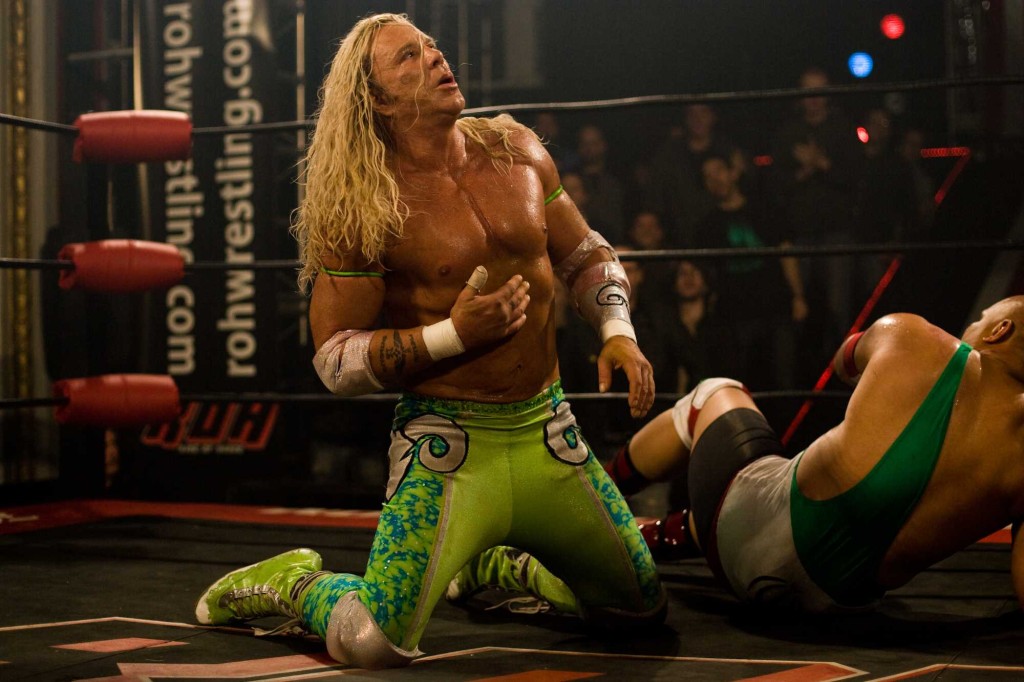 “Lord, why have you forsaken me?”
“Lord, why have you forsaken me?”
When you think about it, we seem to live in a culture that celebrates suffering, from the very religions we practice, to the stories we continually portray about comebacks and rags-to-riches and broken men who become whole again, and all the way down to the current definition of The American Dream, in which you can only find success through raking up the muck and enduring the hardest of trials. If our culture had a mascot, it would be Andy Dufresne, crawling out of the filthy prison sewers and coming out a clean, free man.
Perhaps what Aronofsky is attempting by making these films about these obsessive individuals–and bringing us so fervently into their mindsets–is exposing this pain-worshiping culture for the destructive force that it is. Is there really a clean pool of water at the end of the pipe to wash us of our agony, absolve us of our sins, and make the downward spiral worth it? According to Aronofsky, no.
Perhaps the reason why Tom Creo of The Fountain is the only Aronofsky protagonist to receive that salvation is precisely because the very thing he’s searching for is of an ethereal, religious nature; whereas his other characters, who each gave themselves up completely to their obsessions, were more concerned with earthly, relatively trivial ideals: The highs of Requiem, the comebacks of The Wrestler, the mathematical patterns of Pi (Though there is some ambiguity for how much it connects to the ethereal, and if the protagonist really was “punished” at the end). Or–even more fascinating–the reason why Tom Creo receives salvation is because he’s the only protagonist to give up their obsession completely (Again, the caveat being however you interpret Pi‘s ending).
The Wrestler communicates this sentiment of living in a culture celebrating suffering better than any Aronofsky film, even without the Christ metaphors. This goes back to that singular final shot, the one employed here and in Requiem for a Dream that tells it all with no words: The crowd cheering on Randy’s downfall, unaware that his victory was actually a defeat. Except unlike Requiem, the crowd is most definitely real, and the parallels to our own society through that realism are more evident.
Randy “The Ram” Robinson will indeed remain immortal through all the passion and anguish he had to tread through. It’s up to the viewer, however, whether or not that immortality was truly worth it.
The Wrestler was ultimately the comeback both Aronofsky and Rourke needed. The film was Aronofsky’s highest-rated, with a 98% consensus rating on Rotten Tomatoes, and with Rourke’s career single-handedly revived by the Oscar-buzz his performance garnered.
But with comebacks come promises that must be kept. While Rourke has done some decent work since The Wrestler, none of them have come close to that performance’s level of quality, and there have been a few stinkers from him since then as well. But Aronofsky had to face an equally tough challenge of following up such a highly acclaimed film. The results of which we’ll look at next week with his Best Picture-nominated film, Black Swan.

















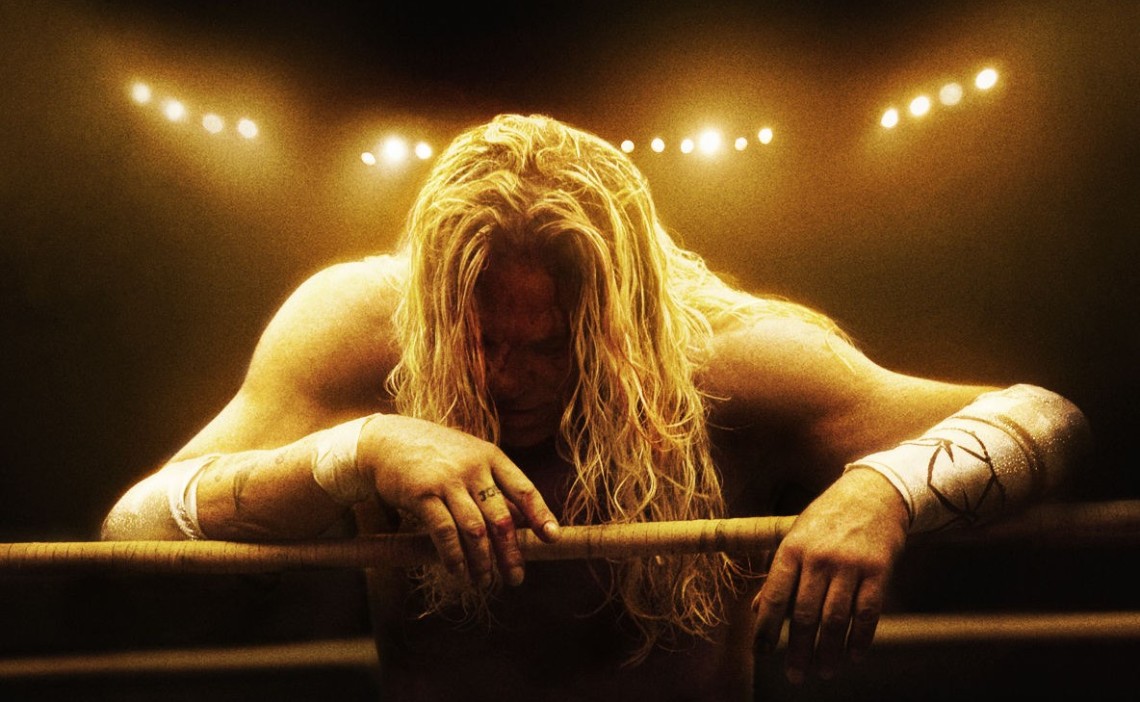
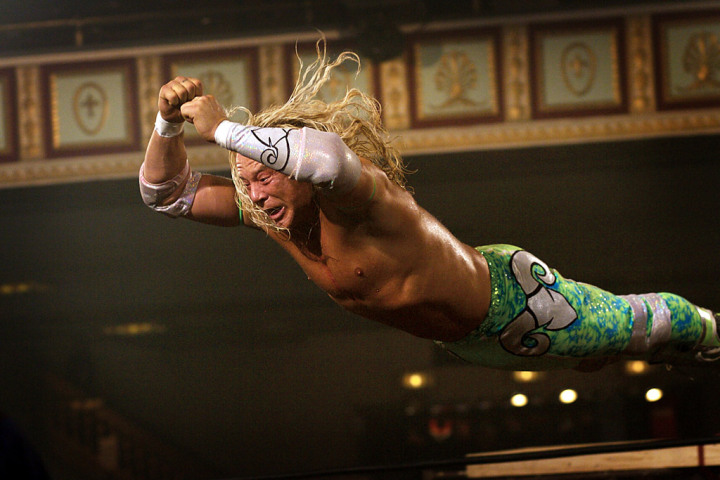
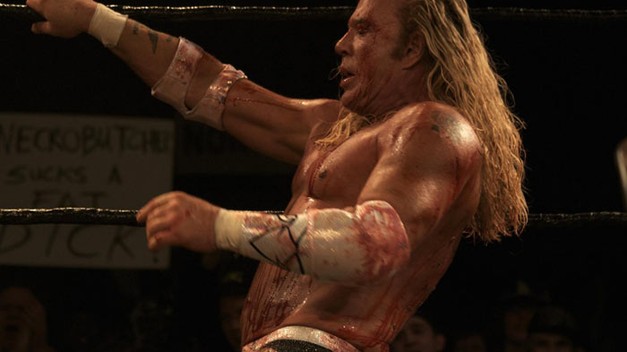
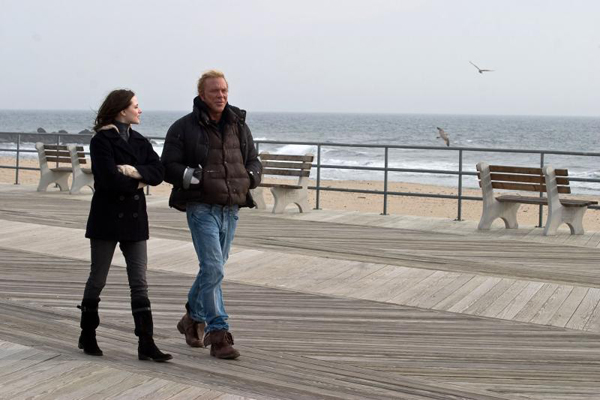
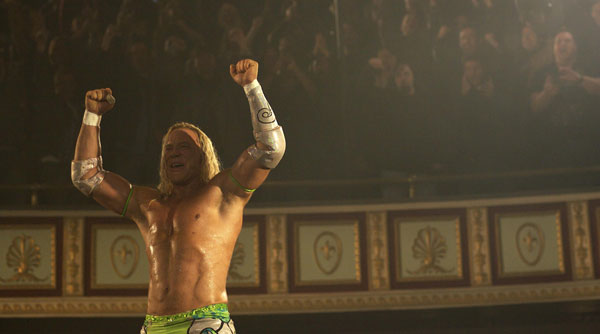
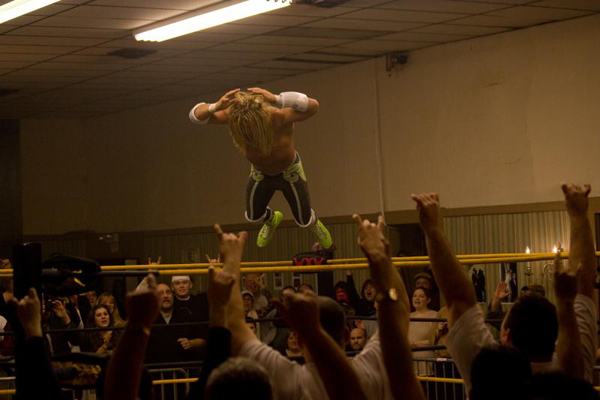
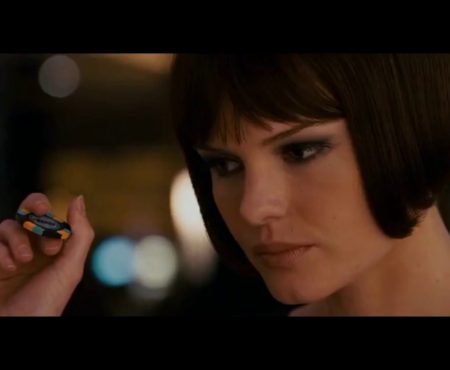
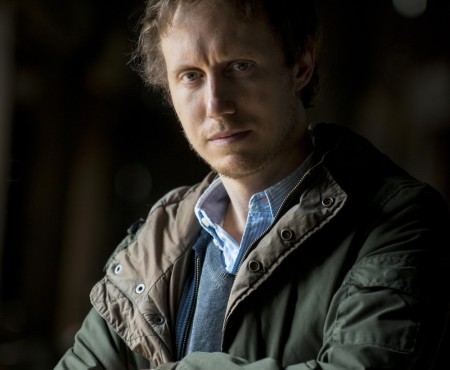
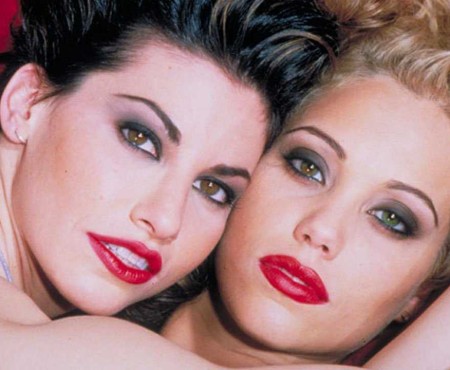
3 thoughts on “The Darren Aronofsky Retrospective: ‘The Wrestler’”
For me, this is Aronofsky’s best film. I connected with it very personally as I’m a fan of pro wrestling. Right now, there’s a story related to the film that might have a happy ending in the works as it alludes to Jake “The Snake” Roberts.
Here was a guy who was a major star in the late 80s and the early 90s in the WWF. Then, he had issues with alcoholism and drug abuse that derailed his career where he became an infamous subject in the 1999 documentary “Beyond the Mat”. The last decade has been tough for him as he struggled to deal with his addictions. This past fall, another former pro wrestler in Diamond Dallas Page has decided to help him get sober through his own DDP Yoga. So far, Roberts has been sober for more than 70 days, had lost a lot of weight, and is regaining some mobility in his body.
Though he needs shoulder surgery which he he went to the Internet for help, fans have donated money to ensure that he’ll get surgery so he can continue to do the DDP Yoga and hopefully have a major comeback soon.
Honestly, to see Jake “The Snake” Roberts starting to turn a corner is a relief and I hope DDP can do the same for Scott Hall.
That’s a really interesting story. It’s always astounding to me when the internet decides to help people out considering how the internet normally is. That and it looks like Jake can have a real shot at a comeback a la Robert Downey Jr., and not a painful comeback by way of Randy. Cool stuff.
Pingback: The Wrestler Review and Blu-ray Features | HitMoviesComics